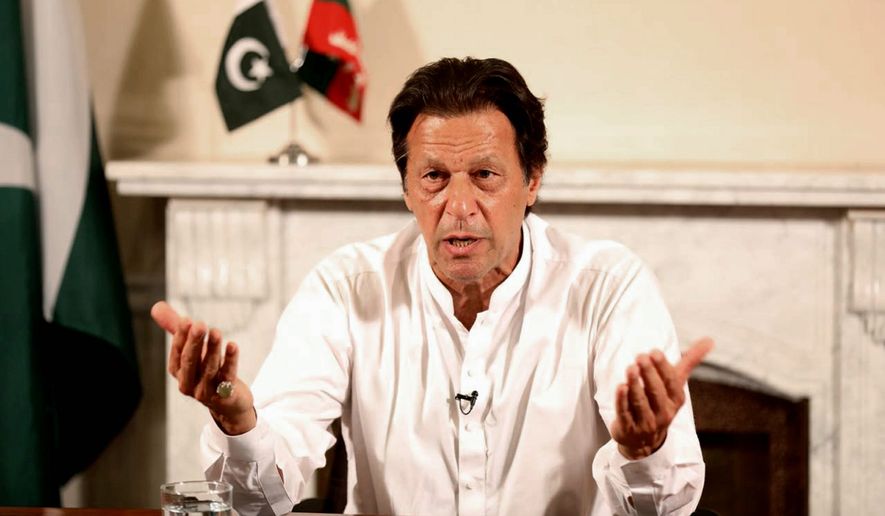Pakistan’s cricket star-turned-incoming prime minister said over the weekend he’s ready to move the nation past its tumultuous election and form a coalition government — but deep questions remain about the controversial Imran Khan’s seemingly pro-Taliban sympathies and whether he can be trusted to crack down on terrorists operating within his borders.
What that means for the Trump administration’s hopes for Pakistani support in the grinding war against terror groups across the border in Afghanistan is one of the biggest question marks.
Mr. Khan, a mainstay of Pakistani politics after leading the nation to victory in the 1992 Cricket World Cup, said over the weekend he’s gained enough support from lawmakers to put together a coalition government. His nationalist Pakistan Tehreek-e-Insaf party captured 115 of 269 contested seats in the National Assembly, short of a majority but enough, party leaders say, to form a sustainable government.
Two rival parties captured 64 and 43 seats, respectively.
“People have voted us into power and God willing, we will form a government,” Fawad Chaudhry, a representative for Mr. Khan’s party, told The Associated Press on Saturday.
But Mr. Khan’s coming ascent to power — he’s set to be sworn into office no later than mid-August — comes with serious questions both internally and on the international stage. President Trump himself this year harshly criticized Islamabad’s effort in the crackdown on extremists, despite what Mr. Trump said was decades of generous U.S. aid. With the Pentagon again reviewing military policy in Afghanistan and the Afghan government hoping to draw the Taliban into peace talks, it’s unclear whether Mr. Khan will help or hinder American efforts in that regard.
Afghan President Ashraf Ghani reached out to the new Pakistani leader Sunday to congratulate him on his victory. “Our focus is not on the past, but on the bright future,” Mr. Ghani said in a statement.
In his victory speech last week, he stressed that he’ll make “every effort to achieve peace” in Afghanistan but said little about curbing extremism. An aide said Sunday that Mr. Khan was considering an early visit to Kabul in light of Mr. Ghani’s message.
Mr. Khan has also said, however, that his government will expect more from Washington, suggesting he and Mr. Trump will not see eye-to-eye on the problem.
“With the U.S., we want to have a mutually beneficial relationship,” he said. “Up until now, that has been one way, the U.S. thinks it gives us aid to fight their war. … We want both countries to benefit, we want a balanced relationship.”
Meanwhile, American military leaders stress Pakistan is key to their strategy. Lt. Gen. Austin “Scott” Miller, the new commander of U.S. forces in Afghanistan told a Senate panel last month that Pakistan continues to engage in contradictory efforts by voicing support for a lasting peace deal while at the same time reportedly financing insurgents groups in neighboring Afghanistan. His comments echo the longstanding U.S. position that Pakistan is a crucial partner against terrorism but must do more.
“It’s obviously a very tough neighborhood with some tough neighbors,” Gen. Miller told members of the Senate Armed Services Committee. “Pakistan must be part of the solution, and we should have high expectations that they are part of the solution,” both militarily and diplomatically.
There’s reason to be concerned that the charismatic Mr. Khan will not take a tough line on the Taliban and other extremist groups, and that he may not represent the partner the U.S. wants and needs. Some regional media have dubbed him “Taliban Khan,” and in the past he’s expressed support for the group.
Pakistan’s powerful security services have long been suspected of tolerating extremist groups along the hard-to-police borderlands, both to keep Afghanistan unstable and as a chip in the larger conflict with arch rival India.
In 2014, Mr. Khan referred to the Taliban as “our brothers” and “our own people,” and he’s refused to publicly condemn the group even after they perpetrated horrific acts of violence such as the 2012 shooting of a 14-year-old activist.
The U.S. last month killed Mullah Fazlullah, the head of the Pakistani Taliban, in an apparent drone stroke in eastern Afghanistan, dealing a major blow to the group. Fully eradicating it, however, will require continued cooperation between the U.S. and Pakistani governments.
Inside Pakistan itself, Mr. Khan’s breakthrough victory — defeating political clans that have long dominated the country’s politics, has many uncertain which way he wants Pakistan to go.
“We are in a complicated situation,” Farooq Sattar, a leader of the Muttahida Qaumi Movement that won six assembly seats, told The New York Times.
International observers say the political climate across Pakistan in the weeks and months leading up to the election was one of intimidation and fear, with politicians opposed to Mr. Khan harassed and even arrested.
Mr. Khan’s top rival, Shahbaz Sharif of the ruling Pakistan Muslim League, saw his party capture 64 seats in the election. But weeks before the election, the former leader of that party and ex-prime minister, Nawaz Sharif, was arrested amid an ongoing corruption probe. At the same time, there were widespread reports that the military was actively working to keep the Pakistan Muslim League from returning to power.
That backdrop could cast a cloud over Pakistani politics as the new government seeks to get its footing.
“What should have been a celebration of democracy consolidation in the country … has turned into a period of instability and uncertainty amid allegations that the military is manipulating the electoral landscape,” Madiha Afzal a Brookings Institution fellow who specializes in foreign policy, wrote recently.
— This article is based in part on wire service reports.
• Ben Wolfgang can be reached at bwolfgang@washingtontimes.com.




Please read our comment policy before commenting.